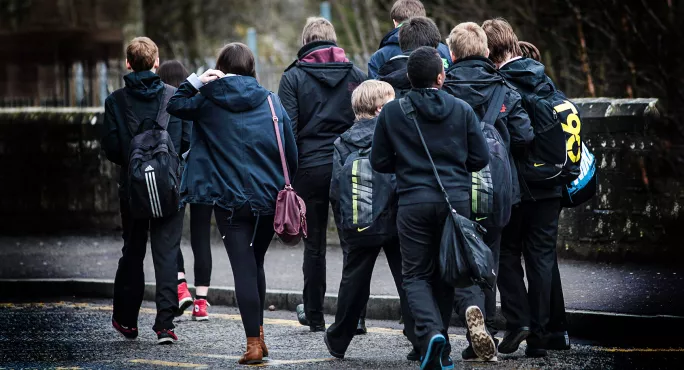Fears that classes could be sent home if Glasgow cuts go ahead

Scotland’s largest local authority plans to cut more than 170 teaching posts next year, but headteachers are warning that the reduction will have dire consequences for pupils and their families.
New staffing formulas for schools, which take account of the cuts to teacher numbers in Glasgow, were this week shared with headteachers.
Susan Quinn, a member of the EIS teaching union’s Glasgow headteachers network, and the head of a Glasgow primary school, says the new staffing arrangements - due to be introduced in August - will lead to pupils’ additional support needs worsening through lack of support.
They could, she said, also result in classes being sent home because schools cannot cover for absent teachers.
Meanwhile Jonathan Cunningham - who also leads a primary school in Glasgow and is vice-president of primary school leaders’ body AHDS - said the AHDS has this week written to the city council over concerns that the new staffing formulas will “severely damage provision and decimate management time available in schools”.
- Related: EIS raises dispute over Glasgow teacher cuts
- School funding: How has Scottish education spending held up over 10 years?
- Analysis: ‘Budget cuts could affect every one of Scotland’s children’
Tes Scotland exclusively revealed last month that Glasgow City Council is planning to cut about 450 teacher jobs over three years, as part of its wider plan to save £27.8 million.
The authority says it needs to fill a budget black hole of £108 million.
In the first year, the cut to education is expected to be £6.7 million, with 172 teaching posts projected to disappear.
According to Ms Quinn, the changes to staffing mean that in “many” primaries, from the start of the new school year, the headteacher will be “the last person standing”. In other words, the head will be the only member of the senior management team without a regular teaching commitment or their own class.
Pupils could be sent home
With supply teachers thin on the ground, she said in an interview with Tes Scotland, one consequence of this is that next year Glasgow primaries could end up having to send children home.
“If one person is absent, the headteacher will be the person who steps in but if there are two people absent, we are going to have to send young people home - after all there are no supply teachers to be had,” said Ms Quinn.
As Tes Scotland revealed last week, teacher absence is rising and is expected to get worse in the coming years.
Teachers in Scotland took an average of 6.8 sick days in 2022-23, the highest level of absence since councils started tracking the data in 2010-11.
On top of this, Ms Quinn warned that much of the work undertaken by teachers when senior managers cover their classes will cease.
She said this would include the small-group work that teachers undertake with children who have additional support needs, the work teachers do to support transition and the support they provide for probationer teachers.
Concerning loss of probationer teachers
The high attrition rate of probationers from the Teacher Induction Scheme this year is already causing concern.
“If the budget cut comes in, pretty much none of that will be possible because it will only be me available to release anybody to do any of those things,” said Ms Quinn, added that the consensus among Glasgow primary headteachers is that the reduction in staffing is “not manageable”.
“There are things we just won’t be able to do,” she said. “We won’t be able to support pupils’ additional support needs to the level we currently are because you need people to do that and our staffing is being cut. It’s really disheartening because we are trying to do our best for the young people in front of us but we know these cuts are going to be detrimental to them.”
Even if pupil numbers are falling, she said, “need is going up”.
She concluded: “You can’t run schools with just one person who is not class committed. It is just not feasible.
“Councillors need to decide what they are happy for schools to stop doing or they need to reinstate the budget cut and allow us to do the best job we can for the young people.”
Minimising the impact of cuts
A Glasgow City Council spokesperson confirmed that there had been meetings with headteachers this week to discuss “future staffing models and service reform”.
The council would do everything “to minimise any impact” but added that in the current financial climate, it had to look at every option.
The spokesperson said: “Officers are looking at several education service reform options as part of a budget that required £108 million of savings from council services over the next three years, not including social care.
“For many years, education spending has been prioritised relative to other services in the budget process.”
The spokesperson added: “However, with the education budget now amounting to more than half of service expenditure directed by the council, it is significantly more challenging to protect education when substantial savings are still required.
“A cross-party political oversight group will be established, and we will continue to engage with employees, parents, carers and trade unions.”
For the latest Scottish education news, analysis and features delivered directly to your inbox, sign up to Tes magazine’s The Week in Scotland newsletter.
You need a Tes subscription to read this article
Subscribe now to read this article and get other subscriber-only content:
- Unlimited access to all Tes magazine content
- Exclusive subscriber-only stories
- Award-winning email newsletters
Already a subscriber? Log in
You need a subscription to read this article
Subscribe now to read this article and get other subscriber-only content, including:
- Unlimited access to all Tes magazine content
- Exclusive subscriber-only stories
- Award-winning email newsletters



